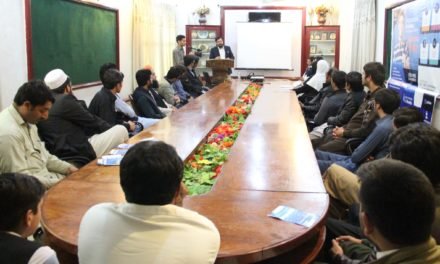By Web Desk
Lahore: Pakistan has touched more than 150 million cellular subscribers with almost 30% penetration for 3G and 4G subscribers. While the Telecom sector is growing at an unprecedented pace, introduction of new technologies into the digital ecosystem offers new opportunities and challenges for the stakeholders including the operators, consumers and regulators.
A one-day training was organized for journalists by Mishal Pakistan with support from Telenor Pakistan as part of generating more informed debate around the opportunities and challenges in telecommunication in Pakistan.
The workshop discussed new regulatory challenges including availability of spectrum, existing challenges of 4G and 4.5G, and the benefits of 5G for the Internet of Things, taxation challenges for the industry and also the new licensing regimes for the Telecom sector.
While giving an overview of how the digital shift is challenging the old norms, Mubashir Zaidi, the lead trainer and veteran journalist, said, “Telecom and technology has brought revolution in journalism like other fields. It has become a necessity for journalists to acquire skills to keep pace with the innovation in technology.”
Keeping pace with the art of storytelling in the digital age requires journalists to have an in-depth understanding of digital trends and policy. The session discussed the ways in which different strategies are used to maintain attention within the changing consumption patterns in digital spaces. The discussion focused on shaping our digital future through universal internet access and adoption, digital transformation, digital identity, governance, cyber resilience, and data.
Moreover, the workshop discussed the need for telecom journalists to have an understanding of the upcoming trends in the digital era while keeping an eye on the digital policies. The challenges that the IT and telecom sector face play a crucial role in defining the way journalists report on the sector. The workshop also addressed how media can play a role in public policy formation and its efficacy.
While speaking to the journalists, Kamal Ahmed, Chief Corporate Affairs Officer, Telenor Pakistan, said, “The fast pace with which the communications technology is evolving calls for urgent measures to apprise our opinion makers on developing tech trends. Such trainings become all the more important when it comes to effective public communication of technological advancements within the local and global markets as it promotes digital literacy and enhances the society’s preparedness for use of emerging technologies.” He further added, “I thank Pervez Iftikhar and Mubashir Zaidi for taking time out of their busy schedules for this important session, and all journalists and opinion makers for their active and very constructive participation.”
The aim of the session was to apprise the journalists of the skill-set required to report on the regulatory environment of the upcoming challenges faced by the telecommunications industry in Pakistan. The training gave an insight into how journalists can effectively play their role in public interest policy-making to generate policy debate on the relevant rules and regulations.
Journalists reporting on IT and telecom from print, electronic and digital mediums were a part of the workshop. The trainings were held in Karachi, Lahore and Islamabad.
Telenor Pakistan’s increasing media footprint and knowledge development initiative specially focuses on engaging stakeholders and promoting public discussion through various social media platforms. Aiming to empower Pakistan through digitalization, Telenor Pakistan has developed a comprehensive digital ecosystem that offers technology-enabled gadgetry to facilitate digital penetration across all economic tiers.
Telenor Pakistan’s vision is to empower society, with an aim of bringing benefits of digital communication to the people of Pakistan and an ambition to assist the Government of Pakistan’s digitization agenda.
Parvez Iftikhar, a seasoned expert with over 40 years of experience in Telecom, while speaking to the journalists at the training said, “Information Communication Technology is now becoming the largest contributor to the national economy, not only because of it’s own contribution but also because it impacts practically every other sector of the economy. Therefore, it is imperative that the journalists of the country are aware of its ramifications and are able to understand, analyze and report on ICT related developments.”





